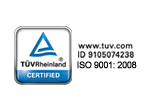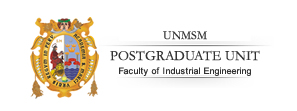
MASTER'S DEGREE IN LOGISTIC SERVICES AND OPERATIONS MANAGEMENTLogistic model to find efficiencies in time and place In the current scenario of globalization and international competition, the Masters in Operations Management and Logistics, will provide the participant the training and tools for managing operations to meet the challenges of international logistics, all this in a world view and computer support for the formulation of models to better decision-making. Graduates of the MSc in Operations Management and Logistics Services is a professional comprehensive, scientific management and preparation, able to formulate models, propose and implement innovative solutions or actions within a systemic and comprehensive, mathematical and statistical support necessary to achieve these ends. First Semester
Second Semester
Third Semester
Fourth Semester
E: Course of the specialty I: Subject of thesis research and development
ORGANIZATION AND ADMINISTRATION OPTIMIZATION MODEL PURCHASING MANAGEMENT RESEARCH PLANNING ENVIRONMENTAL AND SAFETY PRODUCTION MANAGEMENT INVENTORY MANAGEMENT THESIS WORKSHOP I OPERATIONS MANAGEMENT MANAGEMENT OF THE SUPPLY CHAIN THESIS WORKSHOP II INTERNATIONAL LOGISTICS QUALITY AND COST IN LOGISTICS THESIS WORKSHOP III BUSINESS STRATEGIES AUDIT MANAGEMENT SYSTEMS PROJECT MANAGEMENT
Applicants have to submit the following documents to apply for the Masters in question
Payments are made in the Office of Economics at the School of Industrial Engineering, or placing deposits UNMSM Dollars in Savings Account No. 000270016684 Financial Bank on behalf of the Faculty of Industrial Engineering UNMSM
Saturday from 3:00 pm to 9:00 pm and Sunday from 8:00 a.m. to 2:00 pm (subject to change) Industrial Engineering Faculty - Campus UNMSM
|
||||||||||||||||||||||||||||||||||||||||||||||||||||||||||||||||||||||||||||||||||||||||||||||||||||||||||||||||||||||||||||||||||||||||||||||||||||||||||||||||||||||||||||||||||||||||||||||||||||||||||||||||||
| © 2011 - All rights reserved |
|

